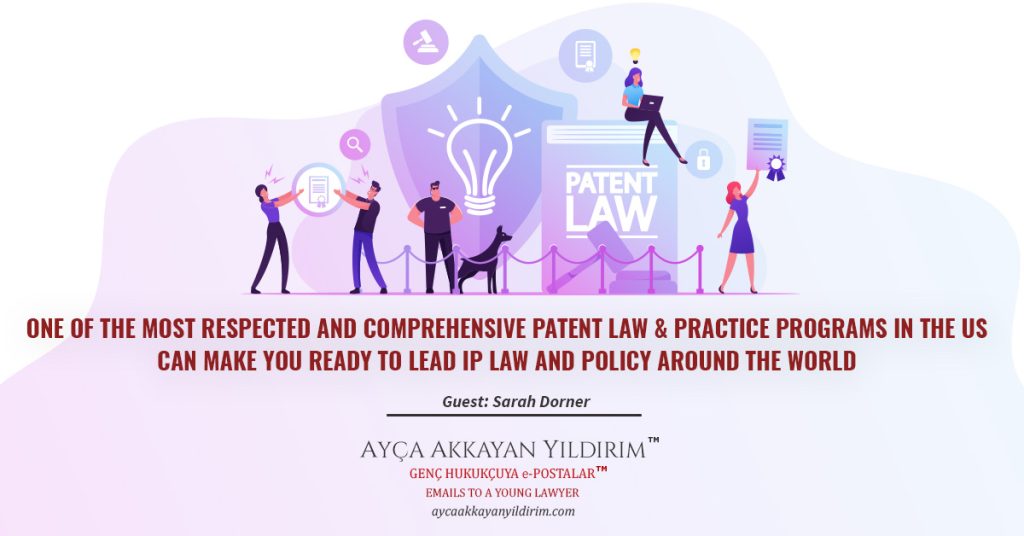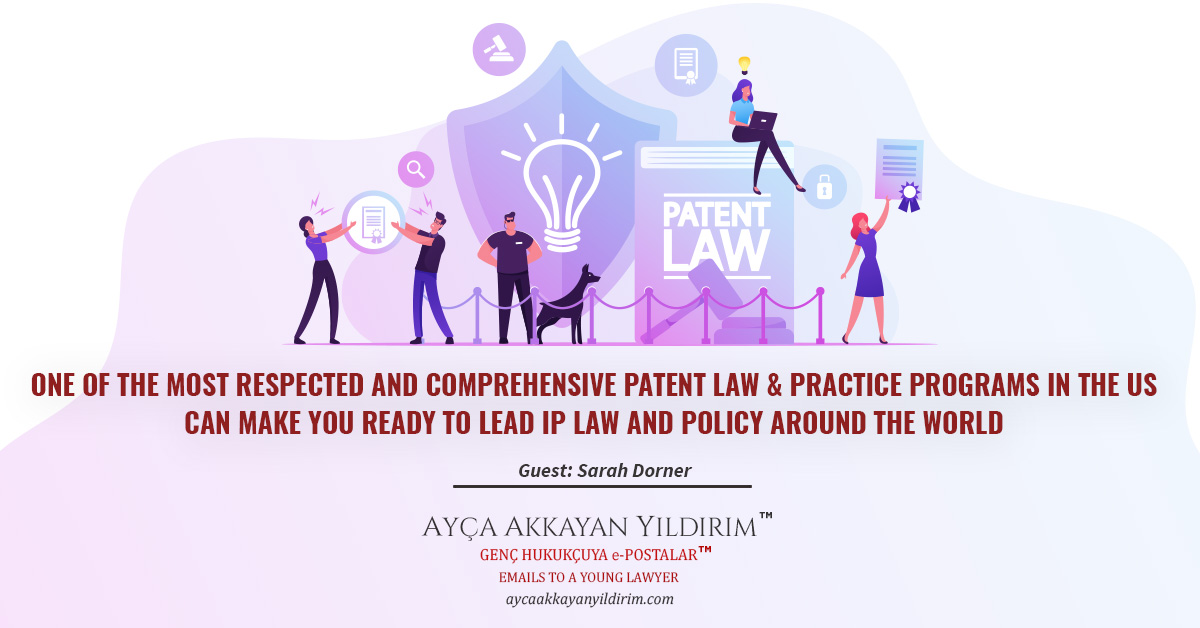Tuesday, May 10, 2022


Date : May 10, 2022
To : Young Lawyers
Re : ONE OF THE MOST RESPECTED AND COMPREHENSIVE PATENT LAW & PRACTICE PROGRAMS IN THE US CAN MAKE YOU READY TO LEAD IP LAW AND POLICY AROUND THE WORLD
INTERNATIONAL LL.M. PROGRAMS: UNIVERSITY of NEW HAMPSHIRE FRANKLIN PIERCE SCHOOL of LAW, CONCORD, NH, USA
I very much thank Sarah Dorner, Director of Graduate and International Admissions, for taking the time to answer my questions. GHK
GHK: Director Dorner, University of New Hampshire Franklin Pierce School of Law has been ranked in the top 10 for intellectual property by US News & World Report for 30 consecutive years. What do you think are the most critical factors behind this success?
SD: We are very proud of our reputation as a consistently ranked top law school for intellectual property. We were founded as the law school for the information age… before the information age even began. We continue to be at the cutting-edge and innovate in this space, including through our first in the nation Hybrid JD in Intellectual Property, Technology, and Information Law. Our alumni have gone on to lead intellectual property (IP) law and policy in over 80 countries around the world, including Argentina, Nigeria, Taiwan, South Korea, India, and more. They are working at global tech giants, multinational corporations, government agencies, and leading international law firms. With more than half our faculty having IP expertise, we are able to offer a broad array of IP and technology law courses. To ensure our students have the resources they need to be successful in these courses, our law school is home to the only academic IP library at a law school in the United States and is one of only three global IP research facilities around the globe. The library also produces The IP Mall, an award-winning website, and the oldest open access IP research site on the web. Lastly, I can’t say enough about all the practical opportunities available to our students through clinics and immersive courses at destinations throughout the country where students learn firsthand from practitioners at the forefront of the industry.
GHK: I understand that University of New Hampshire’s LL.M. in Intellectual Property is available in residential, and online formats. As far as online LL.M. program concerns, can the students work through courses at their own pace? What if the students want to interact with their professors and classmates?
SD: Our online LL.M. in Intellectual Property was designed for working professionals. Courses are offered year-round, and students have up to three years to complete the 24-credit program. This allows students to set a pace that works best for them, and adjust that pace as needed. With this delivery model, students can effectively balance work, school, family, and personal commitments.
All classes are offered asynchronously so students do not need to be online at the same time as their professors and classmates. This enables students from around the globe to earn their LL.M. with us. At the same time, students engage in weekly discussions via discussion boards so that they get to know their classmates and professors and learn from one another’s experiences. Our faculty hold regular office hours and are available to students by email and scheduled appointments using Zoom video conferencing.
GHK: Is LL.M. in Intellectual Property Law designed for a particular type of students in mind? Do the students in the Intellectual Property Law LL.M. program come from diverse backgrounds, including law and science?
SD: When the program first launched, many of our students came from science, technology, engineering, and law backgrounds. Today, we see far more diversity in our student population. We maintain a strong patent practice program but also offer an extensive curriculum in the areas of trademark, copyright, and technology law, including our Intellectual Property and Transaction Clinic and our International Technology Transfer Institute. In addition to science and law, we welcome students with educational and professional backgrounds in the arts, entertainment, marketing, business, education, and more.
GHK: Could you please explain the weight or emphasis given to each part of a student’s application, such as GPA, language score, a letter of motivation, and letters of recommendation?
SD: We truly take a holistic approach to application review. While we consider each of the areas listed above, we do not necessarily emphasize one area over another. The combination of these components of the application helps to paint a complete picture of each individual applicant so that we can make informed admission decisions. All supporting documents are an important part of the applicant’s story, and we give time and consideration to all of them.
GHK: Is there a particular profile of LL.M. applicants that you think would be successful in securing admission to University of New Hampshire’s LL.M. in Intellectual Property Law? What would be your recommendation to a prospective applicant without relevant work experience in intellectual property law?
SD: In addition to a strong academic background (and relevant work experience), we look for applicants who are passionate about the field of intellectual property law. Students with limited professional experience can standout by virtue of the extra and co-curricular activities they engaged in while earning their first degree in law. These applicants can also use their personal statement to discuss their interest in intellectual property, their career goals and how UNH Franklin Pierce can further their ambitions and help them achieve their goals. I would also recommend that students with minimal work experience secure strong letters of recommendations from professors who can speak to their ability to be successful in the legal classroom and in the legal profession.
GHK: Can a student pursuing LL.M. in Intellectual Property Law take courses in bar-tested subjects? Also, how often do you see international students interested in taking the patent bar exam offered by the USPTO?
SD: Absolutely! Since our LL.M. is specialized in a specific area of the law, it is not designed as a general, bar preparation LL.M. However, students have sufficient flexibility within the program requirements to take courses required by state bar exams. The LL.M. is a 24-credit program but students in our in-person program can take up to 34 credits at no additional cost. This affords students even greater flexibility to take all the specialized IP courses they want and still take courses required for the bar exam.
We see a handful of students each year who are interested in sitting for the patent bar exam. This exam does not require students to have an LLM but does require students to have a degree in a technical background, which can be filled with a Bachelor’s, Master’s or PhD. Only citizens and permanent residents can be registered patent agents/patent attorneys. However, nonimmigrant aliens can be granted limited recognition to practice if they are in a patent prosecution job.
GHK: Since LL.M. degrees are typically expensive to obtain, could you please tell us a bit about merit or need-based scholarships that the University of New Hampshire offers? Does applying for financial aid affect one’s chances of admission?
SD: While the cost of higher education in the U.S. can be quite expensive, UNH Franklin Pierce strives to keep our tuition at a more affordable rate so that it is accessible to students from around the world. Applying for scholarship assistance does NOT affect an applicant’s chance of admission. A student’s application is first reviewed for admission and then reviewed once more for scholarships. UNH Franklin Pierce offers several generous, partial tuition scholarships based on both financial need and merit. At the time of application, a student should indicate their interest in being considered for scholarship assistance and write a brief statement as to why they believe they are deserving. When students receive an offer of admission their letter will also include information about any scholarships they have been awarded so that they have all the information they need upfront.
GHK: What are the job opportunities or career services for a foreign LL.M. graduate who has earned an LL.M. in Intellectual Property Law from University of New Hampshire Franklin Pierce School of Law?
SD: The Career Services Office at UNH Franklin Pierce offers comprehensive support services to LL.M. students. Our LL.M. students receive the same level of personalized support offered to JD students. This includes individual and small group workshops geared toward supporting students with how to prepare resumes and cover letters, develop strong interview skills, and guidance on effective networking techniques. Our Career Services Office maintains an internal platform with resources for students which includes a special section dedicated to LL.M. and international students. Among other things, this platform includes alumni contacts, job postings, and information about employers who have previously hired UNH Franklin Pierce graduates. The Career Services team takes a student-centered approach and is committed to working with students individually to understand their career objectives and help them take the next steps in achieving their goals.
In regard to job opportunities, LL.M. students can, of course, work as an attorney if they pass the bar in a jurisdiction that permits it. If they do not take or pass the bar, those with technical backgrounds have opportunities in tech transfer and licensing, which are considered “JD Advantage” jobs. Those without technical backgrounds can look for opportunities in other JD Advantage jobs, such as contract management, trademark management, and paralegal roles. If they have significant experience in their home countries they may be able to find positions in consulting or compliance as well.
GHK: Thank you for your time, Director Dorner. Any parting thoughts for applicants from Turkey considering University of New Hampshire Franklin Pierce School of Law?
SD: This has been a pleasure and I appreciate the opportunity! I invite and encourage interested students to reach out to me directly by email or WhatsApp +16035135300 so we can schedule a call to discuss their interests and talk through the application process. We know applying to LL.M. programs in the U.S. can be daunting, so we are here to support applicants through every step of the process. I would also encourage applicants to begin the process early. All foreign transcripts need to be evaluated by a credential authentication service and, in my experience, this process can take a bit longer than folks anticipate so it is good to plan ahead and give yourself some extra time. I look forward to hearing from you!
